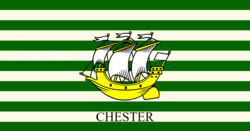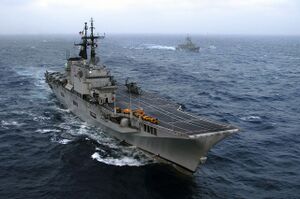Royal Arcerion Naval Service
Overview
| Royal Arcerion Naval Service | |
|---|---|
| Arcer Navy | |
 Ensign of the Royal Arcerion Naval Service | |
| Country | |
| Type | Navy |
| Role | Naval warfare, power projection, Humanitarian aid/intervention, Coastal defense, maritime law enforcement, search and rescue, and sealift |
| Size | 561,647 personnel |
| Part of | Armed Forces of Arcerion |
| Garrison/HQ | HMANS Chester-on-Moore |
| Nickname(s) | Fort Chester |
| Motto(s) | From Chester to Dunaird |
| Colors | Green, White, Yellow |
| March | Carnish Royal Marines at the Trail Arms |
| Anniversaries | 6 January, 1805 (founding) |
| Engagements | Arcer Bush Wars |
Role
History
Colonial Expeditionary Escorts
Arcerion Coast Guard
Founding
19th Century to 20th Century
Second Great War
Modern Period
RANS Today
Personnel
His Majesty's Arcerion Naval Service Station Port Hughes serves as the basic training facility of Arcerion's sailors and naval officers. While naval officers will complete their academic education at the Royal Arcerion Military College, their practical seafaring and leadership education is done through HMANSS Port Hughes. After initial intake and testing, personnel are separated into multiple service streams, from Naval Warfare, to engineering and logistics, depending on their suitability based on entry testing and fitness. Officers and enlisted members who wish to join the Arcerion Regiment of Marine Commandos also self-identify during this period so they can attend Assessment and Selection programs after their initial training phase.
Surface Fleet

Aircraft Carrier
The RANS only has one remaining aircraft carrier, the ACS Kurst. With an original unit cost of £1.319b Arcer Pounds, and it displaces 9,900 long tons before combat loading. It was laid down in 1984, and launched in 1987, commencing and completing flight trials the same year, being declared operationally ready for sea trials in 1988. It was commissioned in 1988 in Chester-on-Moore, and has remained as the flagship of the Arcerion Navy since then, when it took over the title from the destroyer ACS Windswept. The Kurst is the central piece of Arcerion's expeditionary naval force and represents the central component to both the Naval Air Service and Arcerion Carrier Group 1, the nation's only full-time blue water expeditionary strike group along with its escorts and support ships.
Amphibious Warfare and Anti-submarine Warfare
Arcerion maintains a larger component of 'flat-top' ships for conducting expeditionary operations supported by helicopters, which became a central part of Arco Naval doctrine after liaisons attached to the Army during the Fourth Bush War identified their use for troop deployment using vertical envelopment. This coincided with an increased emphasis on the Navy during the 2022 Confederate Memo on Defence, which outlined the need for two additional helicopter carriers to join the fleet to support international operations. The main capability for this is a trio of ships, the Nathaniel-class Landing Platform Docks, and the Future Helicopter Expeditionary Support Ship Program (FHESSP) which is undergoing evaluation for a contract awarding and ship construction to begin no later than 2027. While the primary role of the Nathaniel-class is to conduct expeditionary operations, they are primarily meant for supporting expeditionary and humanitarian missions.
The Navy also maintains the most robust anti-submarine warfare capability in the Malentine and Songun Seas. The majority of this is provided by the three Nathaniel-class LPDs and their on-board maritime helicopters, but there is dedicated surface vessels that also complement the task. This is accomplished by the older Gibson-class Frigates, of which six are still in service.
Clearance Diving and Mine Warfare
Arcerion Naval Clearance Divers are Ixnay leaders in Explosive Ordinance Disposal (EOD) and mine defusal. Clearance Divers are trained at His Majesty's Arcerion Naval Service Station Port Gibson, Foxhey Governorate, at the Explosive Threat and Management School (ETMS), which is run jointly with members of the Royal Arcerion Engineers from the Arcer Army. Clearance Divers also provide detachments to Arcerion Special Operations Command for maritime special operations.
For mine hunting, minesweeping, and minelaying, the surface fleet has two dedicated ship classes to conduct such activities. The primary mine hunter and minesweeper for the RANS is the Rockenborough-class, numbering five ships, and the three-ship Bradford-class minelayers representing the offensive and sea denial capability for Arcerion. The Submarine Service also includes a limited amount of ocean floor and seafloor minelaying capability, but these have not been officially disclosed by the Arcer Government.
Escort Fleet
Warrington class destroyers
Bounty-class frigates
Patrol Fleet
Hughes class corvettes (replaced by AVISO)
Oceanographic Ships
Arcerion Merchant Marine
Submarine Service
Arcerion Regiment of Marine Commandos
Crona
Arctic
Foreign Bases
 Fort St. Michel, Equitorial Ostiecia, Burgundie
Fort St. Michel, Equitorial Ostiecia, Burgundie
Joint Bases
Command and Control
Current Deployed Operations
International Engagements, Relationships, and Partnerships
Heraldry and Titles
Ships, Stations, and Formations
Ships in Arcerion follow two distinct naming conventions, those being pre-Carnish Revolution, and post-Carnish Revolution. Ships, stations, and formations that were established, named, or decreed prior to the Carnish Revolution and the dissolution of the Carnish Monarchy are given the prefix "Royal." In the cases of sailing ships and submarines, this meant the historical use of His/Her Majesty's Arcer Naval Ship (HMANS). However, after the Carnish Crown ceased to exist, it now only remains as the historical and figurative figurehead of the Navy. Modern ships (usually post-Second Great War), are given the prefix Arcerion Confederate Ship (ACS). Shore installations are similar in nature, with pre-war names indicating their Crown-affiliation. The naming convention follows ships, as in Royal Arcerion Naval Service Station (RANSS) or His/Her Majesty's Arcerion Naval Station (HMANS), and the two are considered interchangeable. Post-war institutions have a variety of names, with no set prefix, for example, the Arcer Navy Testing and Research Centre (ANTRC) which tests and conducts weapons evaluations was created in the 1960s therefore has no Royal Affiliation.